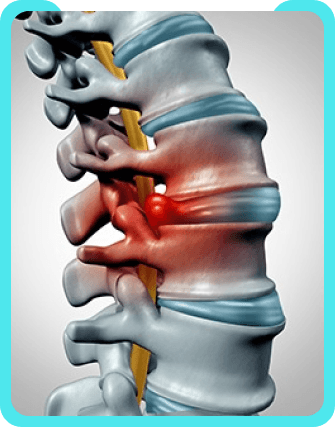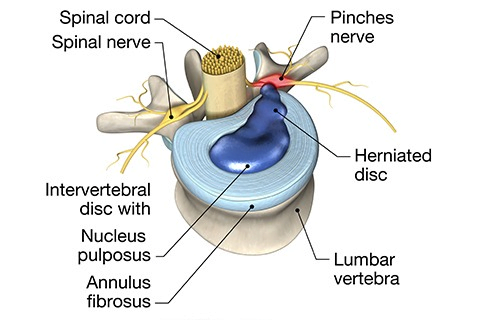
Herniated Discs
- Home
- Conditions
- Back & Spine Conditions
- Herniated Discs
What is a Herniated Disc?
A herniated disc, also known as a slipped or ruptured disc, occurs when the soft inner gel-like substance of the spinal disc (nucleus pulposus) leaks out through a tear in the tough outer layer (annulus fibrosus). This condition can cause pain, numbness, or weakness in the spine and areas where the affected nerves travel.
Treatment for Herniated Discs
Anatomy of the Spinal Disc
Spinal discs are cushion-like pads located between the vertebrae in the spine. Each disc acts as a shock absorber, allowing for flexibility and movement while protecting the vertebrae from impact. The disc has two main parts:
- Nucleus Pulposus: The soft, jelly-like core that provides cushioning.
- Annulus Fibrosus: The tough, fibrous outer layer that encases and protects the nucleus pulposus.

Prevalence & Etiology
- Age: Degenerative changes in the disc due to aging.
- Trauma: Sudden or repetitive strain on the spine.
- Genetics: Family history of disc problems.
- Occupational Risks: Jobs requiring heavy lifting, twisting, or prolonged sitting.
- Lifestyle Factors: Sedentary lifestyle, smoking, and obesity.
Symptoms of a Herniated Disc
Symptoms vary depending on the location of the herniated disc and the severity of the condition:
- Back Pain: Localized pain in the lower back or neck.
- Radiculopathy: Pain radiating to the arms or legs, depending on the affected nerve.
- Numbness or Tingling: Sensations in the areas served by the affected nerves.
- Weakness: Muscle weakness in the affected limbs.
- Loss of Bladder or Bowel Control: Rare but serious symptom requiring immediate medical attention.
Diagnosis
Diagnosis of a herniated disc involves:
- Medical History: Understanding the patient’s symptoms and activities.
- Physical Examination: Checking for signs of nerve involvement.
- Imaging Tests: MRI, CT scans, or X-rays to visualize the herniated disc and its impact on nearby structures.
Treatment for Herniated Disc
Epidural or Transforaminal Injection
Purpose: To reduce inflammation and alleviate pain.
Procedure: Administering a corticosteroid injection into the epidural space or targeting the specific nerve root affected by the herniation.
Benefits:
- Provides temporary pain relief.
- Reduces inflammation
- Facilitates participation in physical therapy and rehabilitation.
Ideal For:
- Patients with severe pain with no response to oral medications.
- Individuals experiencing radiating pain, numbness, or weakness due to nerve compression.
Endoscopic Discectomy
Purpose: To remove the herniated portion of the disc and relieve nerve compression.
Procedure:
- Utilizing minimally invasive techniques with an endoscope and surgical instruments.
- Making small incisions to access and remove the herniated disc material.
Benefits:
- High success rate for pain relief and functional restoration.
- Shorter recovery time and less postoperative pain compared to traditional surgery.
Ideal For:
- Patients with severe or persistent symptoms not relieved by conservative treatments.
- Individuals with significant functional impairment due to the herniated disc.
Treatment Considerations
Initial Approach: Conservative treatments like physical therapy, medications, and lifestyle modifications are typically tried first.
When to Consider Invasive Treatments
- Persistent or worsening symptoms despite conservative management.
- Severe pain or neurological deficits affecting daily activities.
Goals
- Alleviate pain.
- Restore function.
- Prevent further injury or complications.
Combined Approach
Conservative Treatments: Physical therapy and lifestyle modifications are the first line of treatment.
When to Consider Invasive Treatments: If symptoms persist or worsen despite conservative management.
Goals: Alleviate pain, restore function, and prevent complications.
at Alleviate Pain Clinic
we combine advanced procedures with physical therapy and lifestyle modifications to ensure comprehensive care and lasting relief. Contact us to discuss your personalized treatment plan for herniated discs.
FAQ'S
You can have a slipped disc in any part of your spine, from your neck to your lower back. The lower back is one of the more common areas for slipped discs. Your spinal column is an intricate network of nerves and blood vessels. A slipped disc can place extra pressure on the nerves and muscles around it.
- pain and numbness, most commonly on one side of the body
- pain that extends to your arms or legs
- pain that worsens at night or with certain movements
- pain that worsens after standing or sitting
- pain when walking short distances
- unexplained muscle weakness
- tingling, aching, or burning sensations in the affected area
Prior to treatment for a herniated disc at Alleviate, your doctor will ask for a history of the issue, provide a physical examination and may request an MRI. Fortunately, if you do in fact have a herniated disc, our doctors specialize in non surgical treatments to help relieve your pain and improve function.
The doctors at Alleviate will tailor a treatment plan to meet your individual needs. Herniated disc treatments at Alleviate may include Physical Therapy, Manual Therapies, Epidural Injections and Nerve Root Blocks and Endoscopic spine procedure .
The first step in figuring out what the best Herniated Disc treatment plan for you is to make an appointment to see one of our herniated disc doctors in NYC. Pain Specialists and Interventional Spine Specialist are a good option for herniated disc diagnosis and to learn your non-surgical herniated disc treatment options.
Video Spotlight
Blog
Surgery-Free Solutions
Expert Tips for Pain Management
Testimonials
Words From Our Patients
Dr wiquar ahmed treated me, he dioganised my left theigh and leg pain, he was advising politely and friendly atmosphere, Injucted effected lower spinal disc very carefully. I wish for his most success in career and devolopment of all alliviate pain management hospital to treat all pain persons. Physiotheraphy sect io n and reception sections are having good staff. all are very polite and good behaviour persons. Once again i an all staff. Thanks to all.
I’ve had my pain management treatment for low back sciatic pain from Alleviate Jayanagar, I’m recovering well and coming out of pain. Thanks to Dr. Wiquar Ahmed for taking necessary steps and making us understand the underlying issues and also for being helpful and supportive. I also thank Dr. Rijo for helping in physiotherapy. Thanks to Swarna for being very reachable and co-operative throughout.
GOPALAKRISHNA from Nelamangala suffering from low back pain. Visited alleviate pain management hospital in dasarahalli .consulted dr wiqqar Ahmed and he explained the problem of lower back pain and suggested for physiotherapy and now I am feeling better
consulted for my Aunty Sumitra with Dr Swagatesh in Alleviate Dasarahalli clinic for sever low back pain doctor explained procedure and done ..After that with Dr.chaithra she took physiotherapy after her treatment she very happy and she is very good now..Thank u Alleviate
Dr wiquar ahmed treated me, he dioganised my left theigh and leg pain, he was advising politely and friendly atmosphere, Injucted effected lower spinal disc very carefully. I wish for his most success in career and devolopment of all alliviate pain management hospital to treat all pain persons. Physiotheraphy sect io n and reception sections are having good staff. all are very polite and good behaviour persons. Once again i an all staff. Thanks to all.






